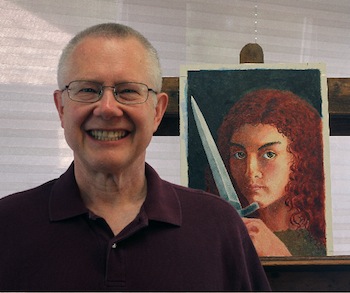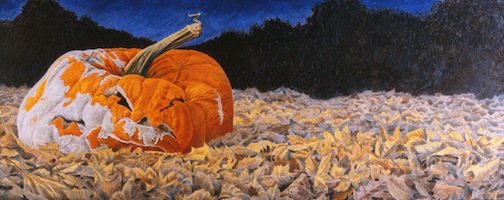 Morgan Howell is the pen name of Will Hubbell, sci-fi-writer and author of children’s books. He has been writing novels for years and one of them is the fantastic trilogy about Dar in „Queen of the Orcs“. (Photo: Copyright William H. Hubbell, next to him a picture of his new heroine Nartha-hak)
Morgan Howell is the pen name of Will Hubbell, sci-fi-writer and author of children’s books. He has been writing novels for years and one of them is the fantastic trilogy about Dar in „Queen of the Orcs“. (Photo: Copyright William H. Hubbell, next to him a picture of his new heroine Nartha-hak)
Thank you for taking the time for this interview.
I’ve just finished your great trilogy about Dar in „Queen of the Orcs“. In some ways it reminded me of Jean M. Auels saga about the Stone Age. The conflict between different cultures is very distinct in both novels. How did you come up with the series or what was first: characters or story?
The story began with a question: what if orcs were actually a noble race? If that was true, then I had to explain why humans regarded them as demons. My answer was inspired by American history. In the nineteenth century, Indians were commonly viewed as evil incarnate. That attitude helped eased the white man’s conscience as he stole Indian lands. The conflict between whites and Indians guided my writing when I wrote about the urkzimmuthi and the washavokis.
I created Dar to transform the reader’s vision of orcs as her attitudes evolve. She’s the heart of the story. As a woman living in a traditional society, she’s helpless in a man’s world. At first, orcs terrify her. But after she understands their culture, she’s empowered by her knowledge. I thoroughly enjoyed writing Dar’s complex interactions with Kovok-mah.
The Orcs in your story have their own culture and language. How much time did you spend with the development of all the details?
I immersed myself in orc culture. I tried to imagine every aspect of their lives, so I could understand how they would act in any given situation. Believing that people learn about others through observation, I avoided describing orc culture in favor of showing it in action.
One of the first things I did upon conceiving the story was to devise the grammar of the orcish language and begin a dictionary. Language reflects culture, so I put much thought into creating Pahmuthi. The word, which translates as „speech of mothers,“ demonstrates the language’s matriarchal roots. The abundant personal pronouns show gender’s importance. I had fun combining words to create new ones. For example, the alcoholic drink, falfhissi, combines „water“ and „laugh.“ I also paid much attention to how the language sounds when spoken.
How did you keep track of all the characters and rituals and words?
I kept a detailed notes on characters and cultural practices. As for the words, I own a copy of Professor Hubbell’s Traveler’s Guide to Orcish: A Grammar and Dictionary for Everyday Usage.
What and who was your inspiration to start writing?
I was an artist who wanted to create picture books, and to have complete control, I had to write them. Thus Maurice Sendak, Chris Van Allsburg, and Holling Clancy Holling—all writer/illustrators— first inspired me. When I started writing novels, J. R. R.Tolkein, Ursula K. LeGuin, John Cavell, and Elizabeth Marshall Thomas became inspirations.
How much of your experiences in the military go into your writing?
Being in the military convinced me that warfare is a chaotic and gruesome enterprise that rarely achieves its intended ends. I try to make my battles ugly. My characters are often sickened by what they do in combat.
On the a other hand, a good grasp of tactics is extremely useful for a fantasy writer. In my second trilogy, The Shadowed Path, I have a long passage where my hero conducts a successful one-man guerrilla campaign against thirty-nine armed and armored men.
How did you come up with your pen name?
Since my main character was a woman, I decided to use an androgynous name. In America, both men and woman are named Morgan. My favorite art teacher, a male, was Morgan. So was my favorite cat, a female. „Howells“ was my Grandmother’s maiden name. I dropped the „s,“ so it didn’t sound like „howls.“

A picture out of Hubbell's book "Pumpkin Jack". (Copyright: William H. Hubbell, 2000)
You first wrote children’s stories. How and why did you switch to writing novels?
Actually, I continue to write both, although the novels have taken up most of my time recently. It can take years to break into the children’s market, so as my children aged, I wrote older books for them. My oldest son was a teenager and I was still unpublished when I wrote my first novel. It was about a centuries-long space voyage that was undertaken as an act of faith. That book was never published, but it led to the publication of my first science fiction novel, Cretaceous Sea.
Writing my first novel was a revelation. I fell in love with the power of words to evoke character and emotion. I found I enjoyed creating new worlds and devising tales that drew readers into them. When I’m writing a novel, it’s the place I live. It’s characters and settings become real to me. Writing is the ultimate getaway.
What is the difference for you between writing fantasy/Sci-Fi and children’s books?
The artwork in my children’s books is a major element. The richly detailed drawings are a means for a child to explore the natural world. I would characterize my children’s books as lyrical.
I aim for emotional intensity in my novels, which tends to make them dark in tone. Character is paramount, and my characters often to suffer. I strive to create a fast pace, twists in my plots, and realistic but exotic settings.
Are you currently working on new novels? Can you tell us a little bit about them?
My next novel will revisit the orcs. It’s currently undergoing final editing, and I hope to have it out by early fall. It’s titled A Single Deed, and tells the story of Nartha-hak in her own words. Nartha considers herself an orc, but at eleven she learns that her father was human. The circumstances that lead to that revelation throw her life into a downward spiral. By the time she’s sixteen, Nartha feels she can find solace only by tracking down her father and killing him. She doesn’t understand the human tongue, she knows nothing about human ways, but she believes her goal will be easy to achieve because her father has yellow hair. Nartha thinks such a „freakish trait“ will cause him to stand out like a white stag. By the time she learns otherwise, she can’t return home. Worse, she’s provoked a band of deadly enemies.
The story, which is complete in a single volume, offers an insider’s view of the orc’s culture and an outsider’s perspective of the human’s one. It’s a tale of a life dedicated to revenge that becomes a journey to self-discovery.
Which novels would you recommend and which are currently lying on your nightstand?
I get much of my inspiration from reading nonfiction, but my favorite novels include Reindeer Moon by Elizabeth Marshall Thomas, The EarthSea Trilogy by Ursula K. LeGuin, The Martian Chronicles by Ray Bradbury, The Time Machine by H. G. Wells, The End of Eternity by Isaac Asimov, Shogun by James Cavell, and—of course, The Lord of the Rings by J.R.R. Tolkien.
I’m currently reading The Last Witchfinder by James Morrow. It’s a richly imagined historical novel that’s darkly ironic and often hilarious.
Thank you so much.
